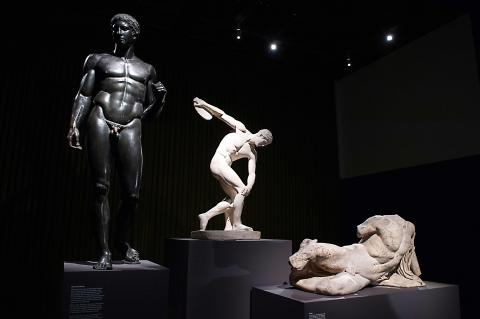The nude sculptures of the ancient Greeks depict what they believed to be the perfect human form, and the results still dazzle and move us thousands of years on, as the British Museum’s latest exhibition demonstrates.
Defining Beauty is a stunning array of sculptures and ceramics that includes some of the most familiar works of Greek antiquity.
The exhibition also compares how other cultures treated the human form and their attitudes to nudity, from the Mayans to the Assyrians.

Photo : AFP PHOTO/LEON NEAL
“The Greeks invented the human being,” Ian Jenkins, the exhibition’s curator, said, pointing to Greek philosophy, mythology and democracy, not just the aesthetics of the sculptures that dominate the exhibition.
The exhibition opens with the striking view of a nude goddess Aphrodite from behind. When visitors walk around the statue, they are met with her guarded, threatening gaze.
Though Greek in origin, she is a Roman copy. So is the discus thrower, Myron’s Diskobolos, a study in the perfect “balance of opposites,” and some of the other statues in the exhibition.
But the museum does display its own prized Greek originals which are the source of a long-running dispute with Greece. Athens has repeatedly called for the return of marble statues from the Parthenon, known as the Elgin Marbles, which were taken from Greece in 1816.
The Greek government protested angrily at the end of last year when the museum loaned one of them to Russia.
Officials at the British Museum acknowledge the difficulty in managing relations with Greece, who did not loan any items to the museum for the exhibition.
Part of the Parthenon’s frieze and the statue of Ilissos, recently returned from Russia, are on display and are a highlight of the exhibition.
Its last piece is Pheidias’s Dionysos, the Greek god of wine, theatre and religious ecstasy. The statue is placed next to a red chalk drawing of a man, drawing attention to the resemblance between the two reclining figures.
The sketch in question is Study for Adam by Michelangelo as he prepared to paint his famous fresco on the ceiling of the Sistine Chapel. Next to Dionysos, it is clear where the Italian master drew his inspiration from, consciously or not, more than a millennium later.

It’s a good thing that 2025 is over. Yes, I fully expect we will look back on the year with nostalgia, once we have experienced this year and 2027. Traditionally at New Years much discourse is devoted to discussing what happened the previous year. Let’s have a look at what didn’t happen. Many bad things did not happen. The People’s Republic of China (PRC) did not attack Taiwan. We didn’t have a massive, destructive earthquake or drought. We didn’t have a major human pandemic. No widespread unemployment or other destructive social events. Nothing serious was done about Taiwan’s swelling birth rate catastrophe.

Words of the Year are not just interesting, they are telling. They are language and attitude barometers that measure what a country sees as important. The trending vocabulary around AI last year reveals a stark divergence in what each society notices and responds to the technological shift. For the Anglosphere it’s fatigue. For China it’s ambition. For Taiwan, it’s pragmatic vigilance. In Taiwan’s annual “representative character” vote, “recall” (罷) took the top spot with over 15,000 votes, followed closely by “scam” (詐). While “recall” speaks to the island’s partisan deadlock — a year defined by legislative recall campaigns and a public exhausted

In the 2010s, the Communist Party of China (CCP) began cracking down on Christian churches. Media reports said at the time that various versions of Protestant Christianity were likely the fastest growing religions in the People’s Republic of China (PRC). The crackdown was part of a campaign that in turn was part of a larger movement to bring religion under party control. For the Protestant churches, “the government’s aim has been to force all churches into the state-controlled organization,” according to a 2023 article in Christianity Today. That piece was centered on Wang Yi (王怡), the fiery, charismatic pastor of the

Hsu Pu-liao (許不了) never lived to see the premiere of his most successful film, The Clown and the Swan (小丑與天鵝, 1985). The movie, which starred Hsu, the “Taiwanese Charlie Chaplin,” outgrossed Jackie Chan’s Heart of Dragon (龍的心), earning NT$9.2 million at the local box office. Forty years after its premiere, the film has become the Taiwan Film and Audiovisual Institute’s (TFAI) 100th restoration. “It is the only one of Hsu’s films whose original negative survived,” says director Kevin Chu (朱延平), one of Taiwan’s most commercially successful